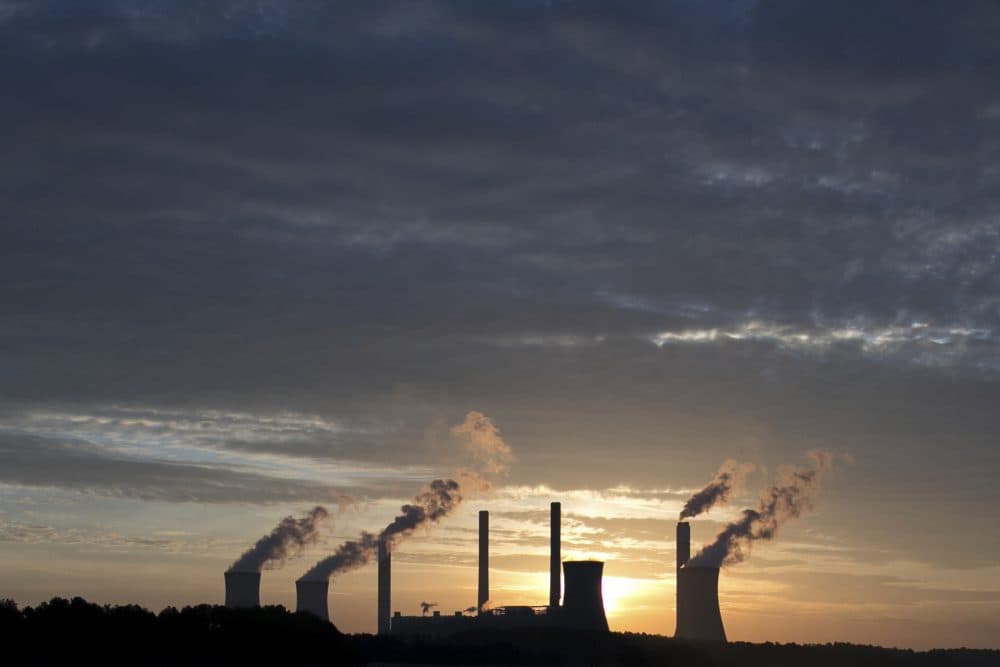Advertisement
Climate Change In Mass.
WBUR Poll Finds A Sharp Increase In Concern About Climate Change Among Mass. Voters
Resume
Part of a new series examining the effects of climate change here in Massachusetts
A new WBUR poll released Wednesday finds concern about climate change among Massachusetts voters has grown dramatically.
This is the fourth time in six years that MassINC pollster Steve Koczela, who conducted the survey for WBUR (topline, crosstabs), has measured public opinion about climate change here in Massachusetts. He sees an important trend.
"The pace of the change in Massachusetts was quite surprising to me," Koczela says. "I was actually quite taken aback at it."
Back in 2011, 77 percent of the registered voters Koczela surveyed said they believed the world was getting warmer. In 2015, it was 78 percent. Now it's 88 percent — and Koczela says the public is coalescing around a cause.
"In this poll we saw a sharp uptick in the people that said that they both believe that it's happening and they believe that it's caused by human activity, at least partly."
The belief that human activities are responsible for global warming is up 11 points in just two years.
But there's still a big political divide: 78 percent of Democrats surveyed say they're already seeing the effects of climate change, compared to 51 percent of Republicans.
David Kelly, a Republican from Haverhill, was among the voters surveyed in the WBUR poll.
"You're born, you die. I think the same thing with the Earth," Kelly said. "I mean the Earth came around zillions of years ago. It just evolved and I think eventually, at some point, hopefully not in my life time, it's just a cycle."
"The really interesting thing about this poll is how sharp the changes were and how sharp the increase in concern is, even compared to 2015."
MassINC pollster Steve Koczela
According to some national polls, worries over the effects of climate change have been steadily increasing across the country. But not as dramatically as the trend Koczela finds in Massachusetts. "The really interesting thing about this poll," Koczela says, "is how sharp the changes were and how sharp the increase in concern is, even compared to 2015."

The big worries among those polled in Massachusetts are all up significantly: three-quarters say they're concerned that in the coming decade the state will experience coastal flooding, extreme heat waves, and sea level rise as a result of climate change. And 82 percent fear Massachusetts we'll be hit by more powerful storms.
Koczela says age is one of the more interesting demographic differences.
"Young people are much more concerned about the long-term threat of climate change, and older people are more concerned about the long-term threat of terrorism."
But there are exceptions.
"I know it's happening. I do believe in global warming, definitely," said 85-year-old Carol Duhamel, of Brockton. She's a registered Republican but she says she didn't vote for Donald Trump. "I think things that used to grow here don't grow any more. And bugs are coming back, so it's all sorts of different ways of the Earth heating up."
Duhamel is one of a growing number of people whom Koczela found are more concerned about climate change since Trump became president.
"There's definitely that irony where the Trump administration is basically trying to push back on climate change policy and instead people are more engaged on climate policy than they've ever been before," Koczela says.
In fact, Koczela found more people paid attention to Trump's withdrawal from the Paris climate accord than its adoption by former President Obama -- 72 percent reported they followed the withdrawal very or somewhat closely, compared to 56 percent who said in a 2015 poll they were following the negotiations.
Xavier Broughton, a registered Democrat from Worcester, makes the political-policy connection.
"I hope Donald Trump opens his eyes and notices that there's actually climate change going on," Broughton said. "Stepping away from the Paris climate talks was probably one of the worst mistakes the United States has ever made."
The poll found that voters still see the threat of terrorism as a larger concern than the threat of climate change. But what was a huge gap is closing. Two years ago, 58 percent of respondents said terrorism posed a greater long-term threat to the United States versus 24 percent who said climate change did. Now 40 percent say climate change is the bigger threat, while 48 percent say it's terrorism.
David Fuhrer, of Lexington, is a Republican who didn't vote for Trump and who puts climate change high on his list of concerns.
"It's scientifically proven. It's a fact," Fuhrer said. "That should be number one on any agenda of any politician. What I would say to the leadership is that you have to run on a platform of reality."
But despite the majority believing climate change is real and caused by human actions, Koczela says people are not holding politicians' feet to the fire. There's still a gap between beliefs and political action.
"The thing that remains a challenge is [voters] still aren't prioritizing it for leaders," Koczela says. "In other words, when you ask about what their top political issues are, climate change is still not anywhere close to things like the economy, education, health care costs, etcetera."
But on a personal level it seems climate, like politics, is local. Koczela found 74 percent of voters interviewed for the poll say they'd pay $10 more a month on their energy bill if it would significantly reduce greenhouse gas emissions.
The live telephone survey of 504 registered voters across Massachusetts was conducted June 19-22 via both landline and cellphone. It has a margin of error of 4.4 percentage points.
This segment aired on June 27, 2017.
